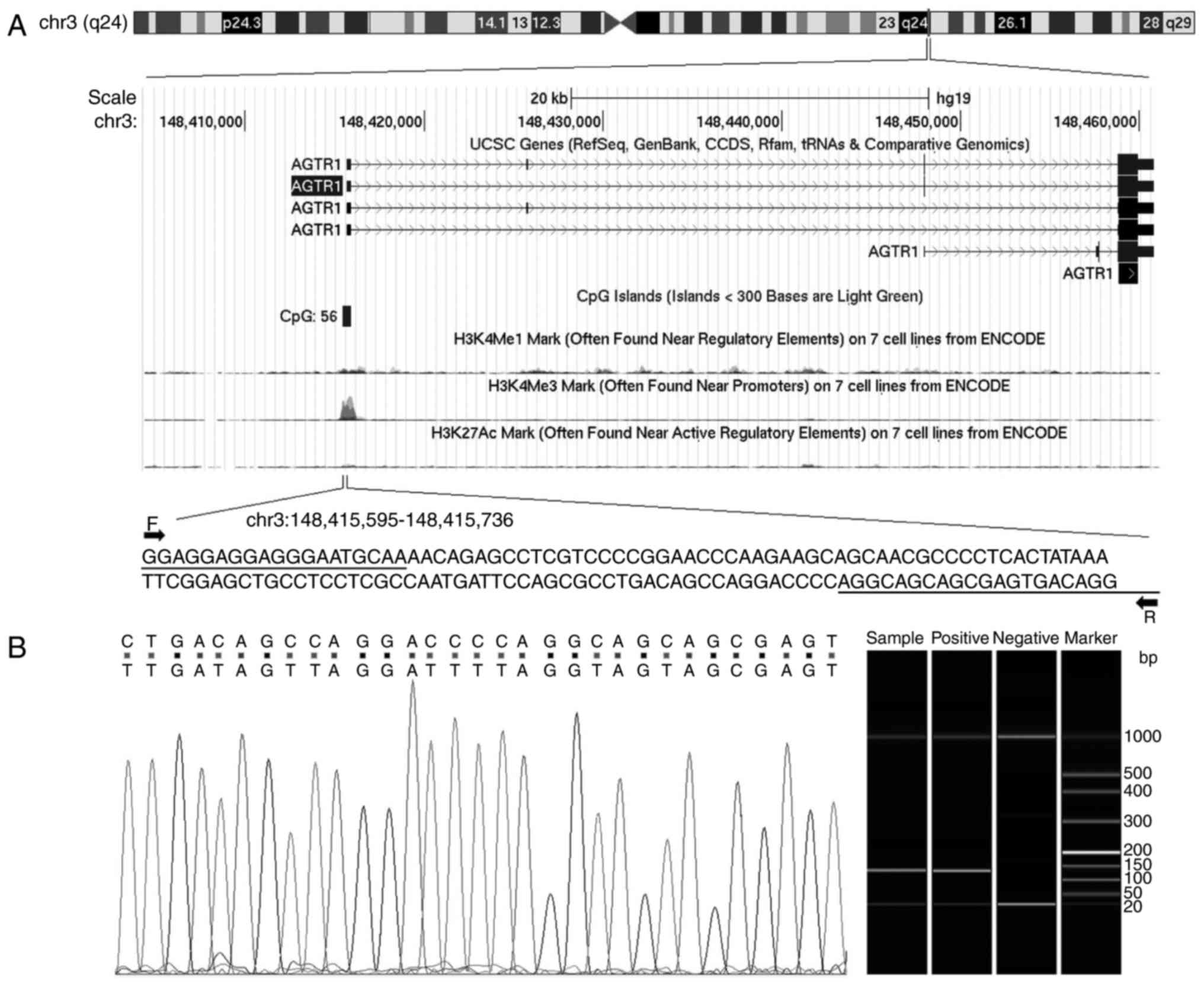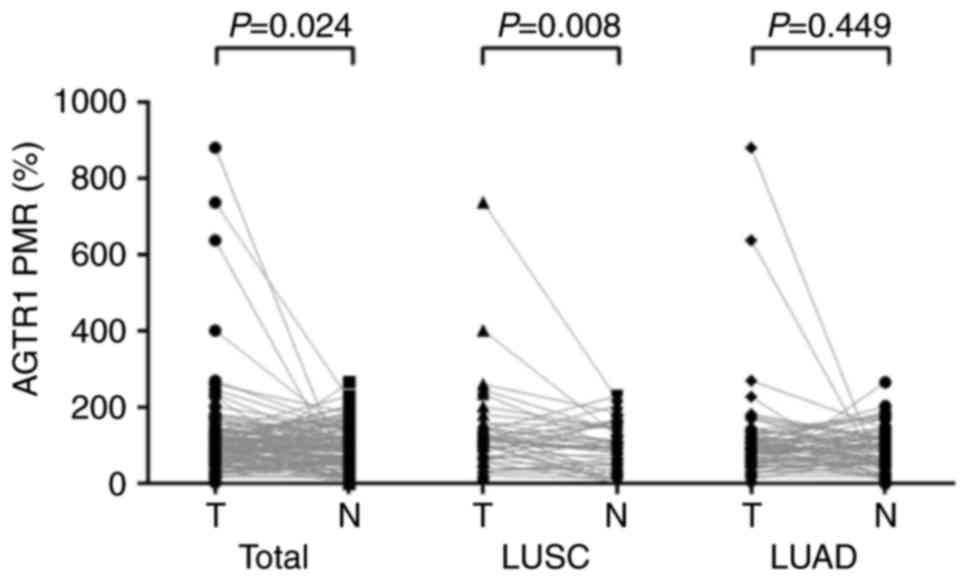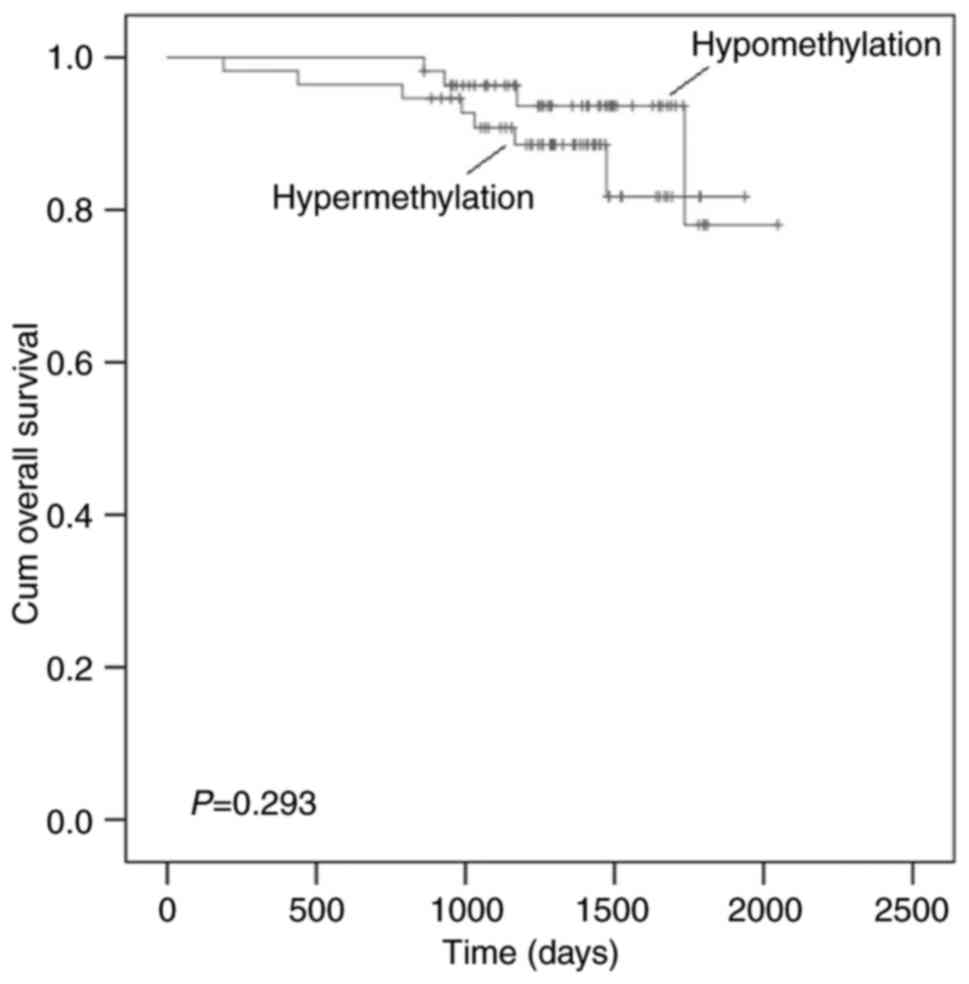|
1
|
Barlési F, Giaccone G, Gallegos-Ruiz MI,
Loundou A, Span SW, Lefesvre P, Kruyt FA and Rodriguez JA: Global
histone modifications predict prognosis of resected non small-cell
lung cancer. J Clin Oncol. 25:4358–4364. 2007. View Article : Google Scholar : PubMed/NCBI
|
|
2
|
McGuire S: World cancer report 2014.
Geneva, Switzerland: World health organization, international
agency for research on cancer, WHO press, 2015. Adv Nutr.
7:418–419. 2016. View Article : Google Scholar : PubMed/NCBI
|
|
3
|
Collins LG, Haines C, Perkel R and Enck
RE: Lung cancer: Diagnosis and management. Am Fam Physician.
75:56–63. 2007.PubMed/NCBI
|
|
4
|
NSCLC Meta-analysis Collaborative Group:
Preoperative chemotherapy for non-small-cell lung cancer: A
systematic review and meta-analysis of individual participant data.
Lancet. 383:1561–1571. 2014. View Article : Google Scholar : PubMed/NCBI
|
|
5
|
Zhan C, Yan L, Wang L, Sun Y, Wang X, Lin
Z, Zhang Y, Shi Y, Jiang W and Wang Q: Identification of
immunohistochemical markers for distinguishing lung adenocarcinoma
from squamous cell carcinoma. J Thorac Dis. 7:1398–1405.
2015.PubMed/NCBI
|
|
6
|
Hong Q, Li Y, Chen X, Ye H, Tang L, Zhou
A, Hu Y, Gao Y, Chen R, Xia Y and Duan S: CDKN2B, SLC19A3 and DLEC1
promoter methylation alterations in the bone marrow of patients
with acute myeloid leukemia during chemotherapy. Exp Ther Med.
11:1901–1907. 2016. View Article : Google Scholar : PubMed/NCBI
|
|
7
|
Yin D, Jia Y, Yu Y, Brock MV, Herman JG,
Han C, Su X, Liu Y and Guo M: SOX17 methylation inhibits its
antagonism of Wnt signaling pathway in lung cancer. Discov Med.
14:33–40. 2012.PubMed/NCBI
|
|
8
|
Haas U, Sczakiel G and Laufer SD:
MicroRNA-mediated regulation of gene expression is affected by
disease-associated SNPs within the 3′-UTR via altered RNA
structure. RNA Biol. 9:924–937. 2012. View Article : Google Scholar : PubMed/NCBI
|
|
9
|
Tsygankova OM, Peng M, Maloney JA, Hopkins
N and Williamson JR: Angiotensin II induces diverse signal
transduction pathways via both Gq and Gi proteins in liver
epithelial cells. J Cell Biochem. 69:63–71. 1998. View Article : Google Scholar : PubMed/NCBI
|
|
10
|
Briet M, Barhoumi T, Mian MOR, Coelho SC,
Ouerd S, Rautureau Y, Coffman TM, Paradis P and Schiffrin EL:
Aldosterone-induced vascular remodeling and endothelial dysfunction
require functional angiotensin type 1a receptors. Hypertension.
67:897–905. 2016. View Article : Google Scholar : PubMed/NCBI
|
|
11
|
Fan R, Mao S, Zhong F, Gong M, Yin F, Hao
L and Zhang L: Association of AGTR1 promoter methylation levels
with essential hypertension risk: A matched case-control study.
Cytogenet Genome Res. 147:95–1029. 2015. View Article : Google Scholar : PubMed/NCBI
|
|
12
|
Foy JP, Pickering CR, Papadimitrakopoulou
VA, Jelinek J, Lin SH, William WN Jr, Frederick MJ, Wang J, Lang W,
Feng L, et al: New DNA methylation markers and global DNA
hypomethylation are associated with oral cancer development. Cancer
Prev Res (Phila). 8:1027–1035. 2015. View Article : Google Scholar : PubMed/NCBI
|
|
13
|
Carmona FJ, Azuara D, Berenguer-Llergo A,
Fernández AF, Biondo S, de Oca J, Rodriguez-Moranta F, Salazar R,
Villanueva A, Fraga MF, et al: DNA methylation biomarkers for
noninvasive diagnosis of colorectal cancer. Cancer Prev Res
(Phila). 6:656–665. 2013. View Article : Google Scholar : PubMed/NCBI
|
|
14
|
Rhodes DR, Ateeq B, Cao Q, Tomlins SA,
Mehra R, Laxman B, Kalyana-Sundaram S, Lonigro RJ, Helgeson BE,
Bhojani MS, et al: AGTR1 overexpression defines a subset of breast
cancer and confers sensitivity to losartan, an AGTR1 antagonist.
Proc Natl Acad Sci USA. 106:10284–10289. 2009. View Article : Google Scholar : PubMed/NCBI
|
|
15
|
Bi FF, Li D, Cao C, Li CY and Yang Q:
Regulation of angiotensin II type 1 receptor expression in ovarian
cancer: A potential role for BRCA1. J Ovarian Res. 6:892013.
View Article : Google Scholar : PubMed/NCBI
|
|
16
|
Du N, Feng J, Hu LJ, Sun X, Sun HB, Zhao
Y, Yang YP and Ren H: Angiotensin II receptor type 1 blockers
suppress the cell proliferation effects of angiotensin II in breast
cancer cells by inhibiting AT1R signaling. Oncol Rep. 27:1893–1903.
2012.PubMed/NCBI
|
|
17
|
Guo S, Yan F, Xu J, Bao Y, Zhu J, Wang X,
Wu J, Li Y, Pu W, Liu Y, et al: Identification and validation of
the methylation biomarkers of non-small cell lung cancer (NSCLC).
Clin Epigenetics. 7:32015. View Article : Google Scholar : PubMed/NCBI
|
|
18
|
Lewis SZ, Diekemper R and Addrizzo-Harris
DJ: Methodology for development of guidelines for lung cancer:
Diagnosis and management of lung cancer, 3rd ed: American college
of chest Physicians evidence-based clinical practice guidelines.
Chest. 143 (5 Suppl):41S–50S. 2013. View Article : Google Scholar : PubMed/NCBI
|
|
19
|
Hughes S and Jones JL: The use of multiple
displacement amplified DNA as a control for methylation specific
PCR, pyrosequencing, bisulfite sequencing and methylation-sensitive
restriction enzyme PCR. BMC Mol Biol. 8:912007. View Article : Google Scholar : PubMed/NCBI
|
|
20
|
Salvador J, Manso L, de la Haba J, Jaen A,
Ciruelos E, de Villena MC, Gil M, Murias A, Galan A, Jara C, et al:
Final results of a phase II study of paclitaxel, bevacizumab, and
gemcitabine as first-line therapy for patients with HER2-negative
metastatic breast cancer. Clin Transl Oncol. 17:160–166. 2015.
View Article : Google Scholar : PubMed/NCBI
|
|
21
|
Koch A, De Meyer T, Jeschke J and Van
Criekinge W: MEXPRESS: Visualizing expression, DNA methylation and
clinical TCGA data. BMC Genomics. 16:6362015. View Article : Google Scholar : PubMed/NCBI
|
|
22
|
Namazi S, Sahebi E, Rostami-Yalmeh J,
Jaberipour M, Razmkhah M, Hosseini A and Arabsolghar R: Effect of
angiotensin receptor blockade on prevention and reversion of
tamoxifen-resistant phenotype in MCF-7 cells. Tumour Biol.
36:893–900. 2015. View Article : Google Scholar : PubMed/NCBI
|
|
23
|
Alhusban A, Al-Azayzih A, Goc A, Gao F,
Fagan SC and Somanath PR: Clinically relevant doses of candesartan
inhibit growth of prostate tumor xenografts in vivo through
modulation of tumor angiogenesis. J Pharmacol Exp Ther.
350:635–645. 2014. View Article : Google Scholar : PubMed/NCBI
|
|
24
|
Chen X, Meng Q, Zhao Y, Liu M, Li D, Yang
Y, Sun L, Sui G, Cai L and Dong X: Angiotensin II type 1 receptor
antagonists inhibit cell proliferation and angiogenesis in breast
cancer. Cancer Lett. 328:318–324. 2013. View Article : Google Scholar : PubMed/NCBI
|
|
25
|
Zhang C, Zhao H, Li J, Liu H, Wang F, Wei
Y, Su J, Zhang D, Liu T and Zhang Y: The identification of specific
methylation patterns across different cancers. PLoS One.
10:e01203612015. View Article : Google Scholar : PubMed/NCBI
|
|
26
|
Word B, Lyn-Cook LE Jr, Mwamba B, Wang H,
Lyn-Cook B and Hammons G: Cigarette smoke condensate induces
differential expression and promoter methylation profiles of
critical genes involved in lung cancer in NL-20 lung cells in
vitro: Short-term and chronic exposure. Int J Toxicol. 32:23–31.
2013. View Article : Google Scholar : PubMed/NCBI
|
|
27
|
Lyn-Cook L, Word B, George N, Lyn-Cook B
and Hammons G: Effect of cigarette smoke condensate on gene
promoter methylation in human lung cells. Tob Induc Dis. 12:152014.
View Article : Google Scholar : PubMed/NCBI
|
|
28
|
Chen K, Wang PP, Sun B, Li Q, Perruccio A,
Power D, Wang C, He MMH, Shibei Y, et al: Twenty-year secular
changes in sex specific lung cancer incidence rates in an urban
Chinese population. Lung Cancer. 51:13–19. 2006. View Article : Google Scholar : PubMed/NCBI
|
|
29
|
Isla D, Majem M, Viñolas N, Artal A,
Blasco A, Felip E, Garrido P, Remón J, Baquedano M, Borrás JM, et
al: A consensus statement on the gender perspective in lung cancer.
Clin Transl Oncol. 19:527–535. 2017. View Article : Google Scholar : PubMed/NCBI
|
|
30
|
Urvay SE, Yucel B, Erdis E and Turan N:
Prognostic factors in stage III non-small-cell lung cancer
patients. Asian Pac J Cancer Prev. 17:4693–4697. 2016.PubMed/NCBI
|
|
31
|
Campoy EM, Laurito SR, Branham MT, Urrutia
G, Mathison A, Gago F, Orozco J, Urrutia R, Mayorga LS and Roqué M:
Asymmetric cancer hallmarks in breast tumors on different sides of
the body. PLoS One. 11:e01574162016. View Article : Google Scholar : PubMed/NCBI
|
|
32
|
Perkins CI, Hotes J, Kohler BA and Howe
HL: Association between breast cancer laterality and tumor
location, United States, 1994–1998. Cancer Causes Control.
15:637–645. 2004. View Article : Google Scholar : PubMed/NCBI
|
|
33
|
Sykes SD, Mitchell C, Pringle KG, Wang Y,
Zakar T and Lumbers ER: Methylation of promoter regions of genes of
the human intrauterine Renin Angiotensin system and their
expression. Int J Endocrinol. 2015:4598182015. View Article : Google Scholar : PubMed/NCBI
|

















